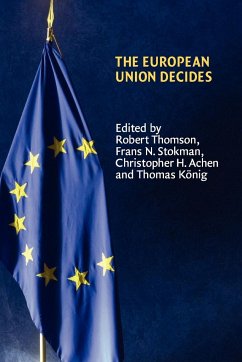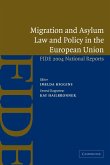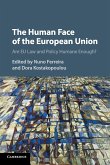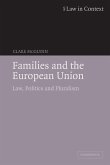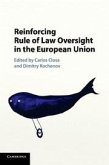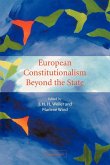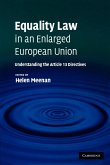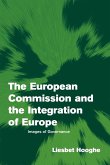A wide-ranging assessment of how decisions are made in the European Union.
European legislation affects countless aspects of daily life in modern Europe but just how does the European Union make such significant legislative decisions? How important are the formal decision-making procedures in defining decision outcomes and how important is the bargaining that takes place among the actors involved? Using a combination of detailed evidence and theoretical rigour, this volume addresses these questions and others that are central to understanding how the EU works in practice. It focuses on the practice of day-to-day decision-making in Brussels and the interactions that take place among the Member States in the Council and among the Commission, the Council and the European Parliament. A unique data set of actual Commission proposals are examined against which the authors develop, apply and test a range of explanatory models of decision-making, exemplifying how to study decision-making in other political systems using advanced theoretical tools and appropriate research design.
Review quote:
'The European Union Decides provides a deep understanding of the institutions of governance in the European Union coupled with keen insight into how decision-making processes work and how one can effectively evaluate alternative accounts of those processes. No one interested in the European Union or in decision-making strategies can afford not to read and internalize the insights in this book.' Bruce Bueno de Mesquita, Julius Silver Professor of Politics, NYU and Senior Fellow, Hoover Institution, Stanford University
'The European Union Decides offers the first systematic empirical assessment of decision-making in the European Union. Guided by the idea of competitively testing various models of decision-making, the authors of this volume demonstrate the usefulness of theory-guided research and provide a unique insight into the EU. Given the carefully crafted empirical tests this volume is not only a must-read for EU scholars, but also researchers engaged in studies of decision-making in other political arenas.' Simon Hug, CIS, IPZ, University of Zürich
Table of contents:
1. Explaining legislative decision making in the European Union Robert Thomson and Madeleine O. Hosli; 2. Research design: measuring actors' positions' saliences and capabilities Robert Thomson and Frans N. Stokman; 3. Testing procedural models of EU legislative decision making Bernard Steunenberg and Torsten Selck; 4. Institutional realism and bargaining models Christopher H. Achen; 5. Compromise, exchange and challenge in the European Union Javier Arregui, Frans N. Stokman and Robert Thomson; 6. Nash versus Schelling? The importance of constraints in legislative bargaining Stefanie Bailer and Gerald Schneider; 7. A cooperative approach to decision making in the European Union Vincent Boekhoorn, Adrian Van Deemen and Madeleine O. Hosli; 8. A procedural exchange model Thomas König and Sven-Oliver Proksch; 9. Beyond informal compromise: testing conditional formal procedures of EU decision making Mika Widgrén and Antti Pajala; 10. Evaluating political decision making models Christopher H. Achen; 11. Evidence with insight: what models contribute to EU research Gerald Schneider, Bernard Steunenberg and Mika Widgrén; Appendix I. Selection of commission proposals; Appendix II. Comparison of expert judgements with each other and with information from council documentation.
Hinweis: Dieser Artikel kann nur an eine deutsche Lieferadresse ausgeliefert werden.
European legislation affects countless aspects of daily life in modern Europe but just how does the European Union make such significant legislative decisions? How important are the formal decision-making procedures in defining decision outcomes and how important is the bargaining that takes place among the actors involved? Using a combination of detailed evidence and theoretical rigour, this volume addresses these questions and others that are central to understanding how the EU works in practice. It focuses on the practice of day-to-day decision-making in Brussels and the interactions that take place among the Member States in the Council and among the Commission, the Council and the European Parliament. A unique data set of actual Commission proposals are examined against which the authors develop, apply and test a range of explanatory models of decision-making, exemplifying how to study decision-making in other political systems using advanced theoretical tools and appropriate research design.
Review quote:
'The European Union Decides provides a deep understanding of the institutions of governance in the European Union coupled with keen insight into how decision-making processes work and how one can effectively evaluate alternative accounts of those processes. No one interested in the European Union or in decision-making strategies can afford not to read and internalize the insights in this book.' Bruce Bueno de Mesquita, Julius Silver Professor of Politics, NYU and Senior Fellow, Hoover Institution, Stanford University
'The European Union Decides offers the first systematic empirical assessment of decision-making in the European Union. Guided by the idea of competitively testing various models of decision-making, the authors of this volume demonstrate the usefulness of theory-guided research and provide a unique insight into the EU. Given the carefully crafted empirical tests this volume is not only a must-read for EU scholars, but also researchers engaged in studies of decision-making in other political arenas.' Simon Hug, CIS, IPZ, University of Zürich
Table of contents:
1. Explaining legislative decision making in the European Union Robert Thomson and Madeleine O. Hosli; 2. Research design: measuring actors' positions' saliences and capabilities Robert Thomson and Frans N. Stokman; 3. Testing procedural models of EU legislative decision making Bernard Steunenberg and Torsten Selck; 4. Institutional realism and bargaining models Christopher H. Achen; 5. Compromise, exchange and challenge in the European Union Javier Arregui, Frans N. Stokman and Robert Thomson; 6. Nash versus Schelling? The importance of constraints in legislative bargaining Stefanie Bailer and Gerald Schneider; 7. A cooperative approach to decision making in the European Union Vincent Boekhoorn, Adrian Van Deemen and Madeleine O. Hosli; 8. A procedural exchange model Thomas König and Sven-Oliver Proksch; 9. Beyond informal compromise: testing conditional formal procedures of EU decision making Mika Widgrén and Antti Pajala; 10. Evaluating political decision making models Christopher H. Achen; 11. Evidence with insight: what models contribute to EU research Gerald Schneider, Bernard Steunenberg and Mika Widgrén; Appendix I. Selection of commission proposals; Appendix II. Comparison of expert judgements with each other and with information from council documentation.
Hinweis: Dieser Artikel kann nur an eine deutsche Lieferadresse ausgeliefert werden.

